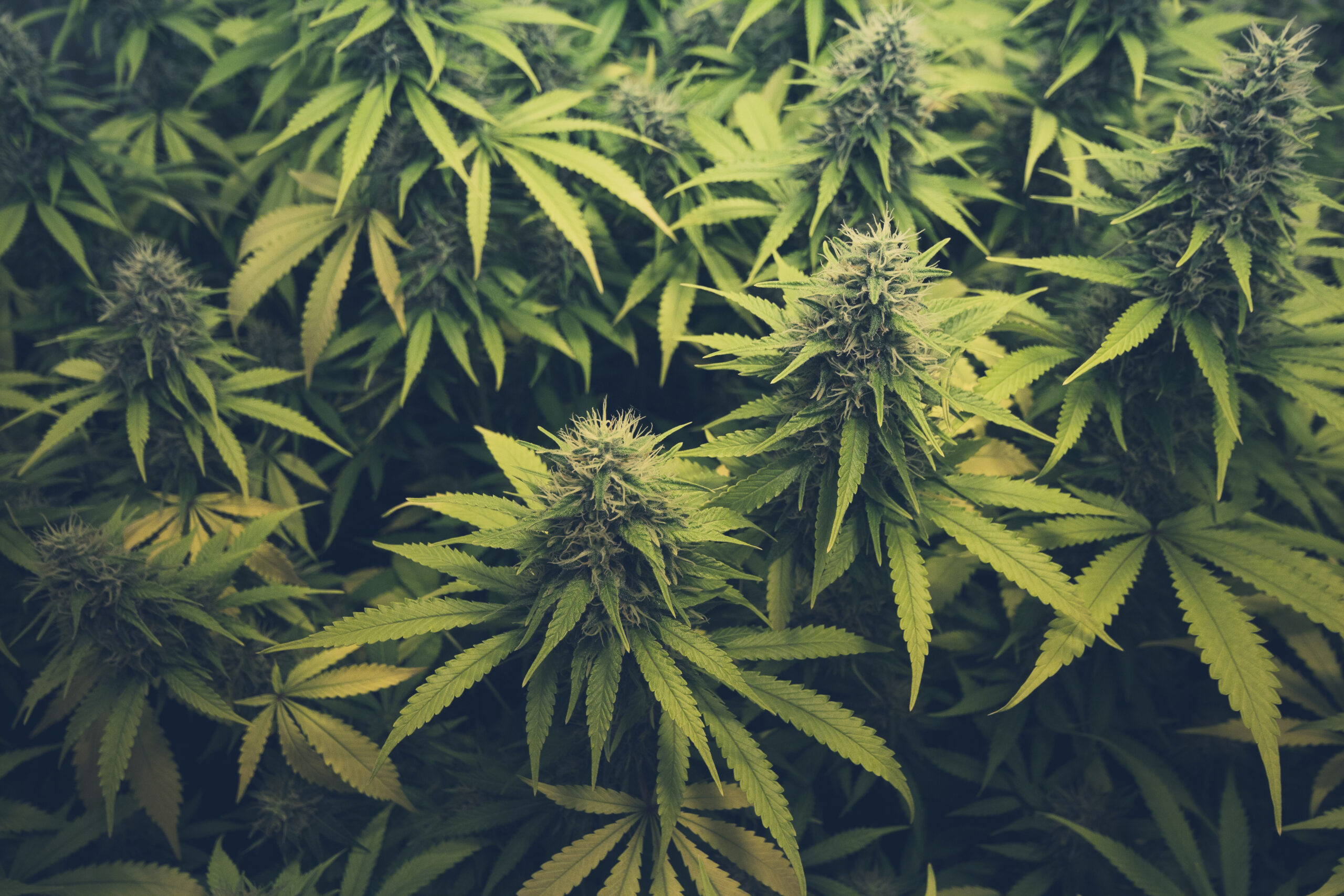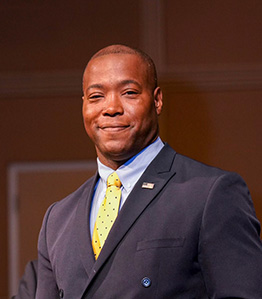
State lawmakers continue to work on legislation that would initiate a legal recreational marijuana market in Virginia. (BizSense file)
A proposal that would kick off recreational cannabis sales in Virginia next year without a phased-in market rollout is gathering steam in the state Senate.
A Senate subcommittee showed support Thursday for a bill introduced by Sen. Aaron Rouse that would allow such sales to start in January 2025 instead of a similar market-launch bill filed by Sen. Adam Ebbin that would allow select businesses to begin to sell recreational pot in 2024.
The two bills differ not only in terms of start dates but in other aspects, including different approaches to how many licenses would be available to operate in the market.
While Ebbin proposed that the state’s current medical marijuana providers be allowed to begin recreation sales in July of this year ahead of a larger rollout of the market next year, Rouse’s bill would have the entire market kick off sales on the same date in 2025.
Ebbin, D-Alexandria, argued his Senate Bill 423 would be the best way forward because it would more quickly introduce legal recreational products to the market, which is awash in an illegal cannabis trade that’s ballooned since possession of the substance was legalized in 2021.
“The bill represents the fastest path to a responsible, regulated market this year,” Ebbin told the subcommittee Thursday. “Adult possession of cannabis has been legal in Virginia for two and half years now and it’s past time for an adult 21 years and older to buy a safe and tested product regulated by the commonwealth.”
Rouse, D-Virginia Beach, then took to the podium and stated that his Senate Bill 448 would create a more level playing field for those who want to get into the business of recreational pot.
“It ensures fair participation. In this bill, no one applicant is preferred over another and there are no head starts. SB 448 is the only option to prevent multistate operators from monopolizing the market,” Rouse said.
Rouse’s bill would permit up to 400 retail stores, 50 wholesalers (called “transporters” in the bill), 60 product manufacturing facilities (called “processing” facilities) and 450 growing licenses that would allow businesses to operate in the market.
Rouse’s legislation would allow the Cannabis Control Authority, the state regulator that would oversee the market, to begin to issue licenses on July 1 of this year, though sales wouldn’t start until Jan. 1, 2025.
The authority also would enforce packaging requirements and regulations regarding potency.
The bill also does away with a current regulation that requires retail stores to be no larger than 1,500 square feet. Rouse’s bill also would allow outdoor cultivation of marijuana, something prohibited in Ebbin’s legislation.
Ebbin’s proposal would allocate licenses to operate in the recreational market by Senate district. Each of Virginia’s 40 Senate districts would be home to at least five licenses for companies engaged in cultivation, manufacturing and wholesale, and at least eight licenses for retail stores.
Both Rouse’s and Ebbin’s legislation would allow localities to hold referendums on whether to prohibit recreational marijuana stores in their jurisdictions.
While the subcommittee showed favor to Rouse’s bill, it didn’t discard Ebbin’s legislation entirely. Instead, it voted Thursday to roll Ebbin’s bill into Rouse’s legislation.
That means elements of Ebbin’s bill could be retained, though the specifics of that weren’t finalized at Thursday’s meeting. The meeting lasted three hours and saw the subcommittee review aspects of the legislation and hear comments from lobbyists, advocates and members of the public.
The bill’s next step will be consideration Friday morning from the Senate rehabilitation and social service committee. The full committee may then need to refer the legislation to the separate courts of justice committee for its review. The legislation would need to clear the committee level before a vote by the full Senate chamber.
In the House of Delegates, an identical bill to Ebbin’s, House Bill 698, is working its way through the committee level. It was introduced by Del. Paul Krizek.
Legislation must pass in both chambers of the General Assembly to get in front of Gov. Glenn Youngkin, who provides the signature needed to make bills into laws. Youngkin earlier this month indicated he has little interest in seeing a legal recreational market established under his watch.
“There’s so many things that we can work on that I think we can get to the finish line, and as I’ve said I just don’t have a lot of interest in pressing forward with marijuana legislation,” Youngkin told reporters after his State of the Commonwealth address this month.
This year’s efforts to legalize recreational sales of cannabis follow failed attempts in 2023 and 2022. While 2021 legislation was passed to legalize the personal use and possession of marijuana, elements of that legislation need to be reenacted to kick off the full retail market.
There is no legal way to buy recreational pot in Virginia at this time, and the only legal sellers of marijuana in the state are the few companies involved in the state’s medical cannabis program.
Cannabist, formerly known as Columbia Care, is the state-sanctioned seller of medical cannabis in the Richmond region and operates several distilleries, including those under the gLeaf brand.

State lawmakers continue to work on legislation that would initiate a legal recreational marijuana market in Virginia. (BizSense file)
A proposal that would kick off recreational cannabis sales in Virginia next year without a phased-in market rollout is gathering steam in the state Senate.
A Senate subcommittee showed support Thursday for a bill introduced by Sen. Aaron Rouse that would allow such sales to start in January 2025 instead of a similar market-launch bill filed by Sen. Adam Ebbin that would allow select businesses to begin to sell recreational pot in 2024.
The two bills differ not only in terms of start dates but in other aspects, including different approaches to how many licenses would be available to operate in the market.
While Ebbin proposed that the state’s current medical marijuana providers be allowed to begin recreation sales in July of this year ahead of a larger rollout of the market next year, Rouse’s bill would have the entire market kick off sales on the same date in 2025.
Ebbin, D-Alexandria, argued his Senate Bill 423 would be the best way forward because it would more quickly introduce legal recreational products to the market, which is awash in an illegal cannabis trade that’s ballooned since possession of the substance was legalized in 2021.
“The bill represents the fastest path to a responsible, regulated market this year,” Ebbin told the subcommittee Thursday. “Adult possession of cannabis has been legal in Virginia for two and half years now and it’s past time for an adult 21 years and older to buy a safe and tested product regulated by the commonwealth.”
Rouse, D-Virginia Beach, then took to the podium and stated that his Senate Bill 448 would create a more level playing field for those who want to get into the business of recreational pot.
“It ensures fair participation. In this bill, no one applicant is preferred over another and there are no head starts. SB 448 is the only option to prevent multistate operators from monopolizing the market,” Rouse said.
Rouse’s bill would permit up to 400 retail stores, 50 wholesalers (called “transporters” in the bill), 60 product manufacturing facilities (called “processing” facilities) and 450 growing licenses that would allow businesses to operate in the market.
Rouse’s legislation would allow the Cannabis Control Authority, the state regulator that would oversee the market, to begin to issue licenses on July 1 of this year, though sales wouldn’t start until Jan. 1, 2025.
The authority also would enforce packaging requirements and regulations regarding potency.
The bill also does away with a current regulation that requires retail stores to be no larger than 1,500 square feet. Rouse’s bill also would allow outdoor cultivation of marijuana, something prohibited in Ebbin’s legislation.
Ebbin’s proposal would allocate licenses to operate in the recreational market by Senate district. Each of Virginia’s 40 Senate districts would be home to at least five licenses for companies engaged in cultivation, manufacturing and wholesale, and at least eight licenses for retail stores.
Both Rouse’s and Ebbin’s legislation would allow localities to hold referendums on whether to prohibit recreational marijuana stores in their jurisdictions.
While the subcommittee showed favor to Rouse’s bill, it didn’t discard Ebbin’s legislation entirely. Instead, it voted Thursday to roll Ebbin’s bill into Rouse’s legislation.
That means elements of Ebbin’s bill could be retained, though the specifics of that weren’t finalized at Thursday’s meeting. The meeting lasted three hours and saw the subcommittee review aspects of the legislation and hear comments from lobbyists, advocates and members of the public.
The bill’s next step will be consideration Friday morning from the Senate rehabilitation and social service committee. The full committee may then need to refer the legislation to the separate courts of justice committee for its review. The legislation would need to clear the committee level before a vote by the full Senate chamber.
In the House of Delegates, an identical bill to Ebbin’s, House Bill 698, is working its way through the committee level. It was introduced by Del. Paul Krizek.
Legislation must pass in both chambers of the General Assembly to get in front of Gov. Glenn Youngkin, who provides the signature needed to make bills into laws. Youngkin earlier this month indicated he has little interest in seeing a legal recreational market established under his watch.
“There’s so many things that we can work on that I think we can get to the finish line, and as I’ve said I just don’t have a lot of interest in pressing forward with marijuana legislation,” Youngkin told reporters after his State of the Commonwealth address this month.
This year’s efforts to legalize recreational sales of cannabis follow failed attempts in 2023 and 2022. While 2021 legislation was passed to legalize the personal use and possession of marijuana, elements of that legislation need to be reenacted to kick off the full retail market.
There is no legal way to buy recreational pot in Virginia at this time, and the only legal sellers of marijuana in the state are the few companies involved in the state’s medical cannabis program.
Cannabist, formerly known as Columbia Care, is the state-sanctioned seller of medical cannabis in the Richmond region and operates several distilleries, including those under the gLeaf brand.


“Distilleries” in last sentence? I don’t think so. Possibly “dispensaries” was intended. Otherwise a nice article.